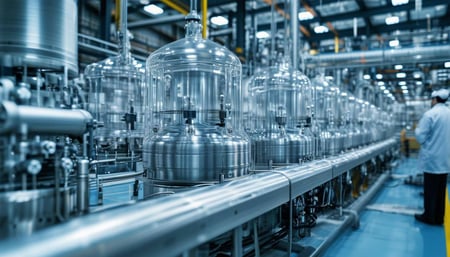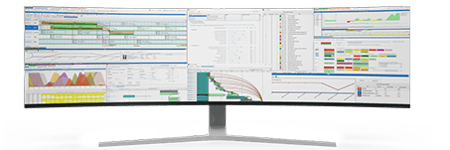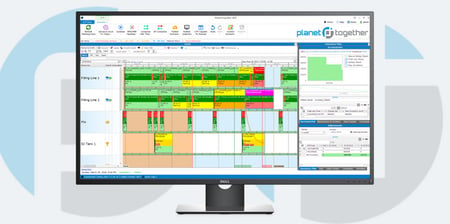Unveiling the Power of Lean Manufacturing and Continuous Improvement in Food and Beverage Manufacturing IT
Discover how Lean Manufacturing and Continuous Improvement, coupled with Manufacturing IT, revolutionize efficiency in Food and Beverage...
Discover how Flexible Manufacturing Systems and PlanetTogether integration enhance agility, efficiency, and compliance in chemical manufacturing.
Chemical manufacturers often face volatile demand, fluctuating raw material availability, stringent regulatory requirements, and the challenge of managing hazardous materials. The need for flexibility in manufacturing systems is essential to respond to market shifts, optimize resources, and maintain compliance. One of the most effective approaches to addressing these challenges is through the implementation of Flexible Manufacturing Systems (FMS).
This blog explores the role of FMS in chemical manufacturing and how the integration of advanced planning and scheduling tools like PlanetTogether with enterprise systems such as SAP, Oracle, Microsoft, Kinaxis, or Aveva can provide the agility and visibility needed to thrive in a dynamic market.

Flexible Manufacturing Systems (FMS) are production methods designed to easily adapt to changes in product types and quantities. While FMS is often associated with industries like automotive and electronics, where frequent changes in product design and volume occur, it is increasingly relevant to chemical manufacturing. Chemical manufacturers are not immune to the need for adaptability, as they often deal with diverse product lines, complex formulations, and variable production processes.
The essence of FMS in chemical manufacturing lies in its ability to:
Manage Product Variety: Chemical plants often produce a wide range of products, from basic chemicals to specialized compounds. Flexibility in manufacturing processes allows for quick changes between product types without extensive downtime.
Optimize Production Resources: Raw material variability, complex chemical reactions, and fluctuating market demand require a system that can efficiently allocate resources (materials, equipment, and labor) to maintain production efficiency.
Minimize Downtime: Equipment changeovers, cleaning processes, and regulatory requirements can lead to significant downtime in chemical manufacturing. An FMS can streamline these processes, reducing idle time and improving overall equipment effectiveness (OEE).
Enhance Supply Chain Responsiveness: Chemical manufacturers need to respond quickly to customer demands, often with short lead times. FMS can improve the synchronization between production and supply chain processes, ensuring timely delivery and minimal stockouts.
Ensure Compliance and Safety: Handling hazardous materials and complying with stringent regulations are critical concerns in chemical manufacturing. FMS can help manufacturers maintain traceability, adhere to safety standards, and meet regulatory requirements by integrating production data with compliance systems.

To achieve flexibility in chemical manufacturing, several components must work in harmony within the FMS framework. These components include:
Automated and Programmable Equipment: Automation is a cornerstone of FMS, enabling the quick reconfiguration of production processes. In chemical plants, programmable logic controllers (PLCs), distributed control systems (DCS), and other automation tools allow for seamless transitions between different chemical processes, ensuring precise control and consistency.
Real-Time Data Monitoring and Control: FMS relies on real-time data from sensors, meters, and control systems to monitor key process parameters such as temperature, pressure, and flow rates. Advanced analytics can help identify deviations from optimal operating conditions and trigger corrective actions before quality or safety issues arise.
Advanced Planning and Scheduling (APS): Efficient scheduling is essential to the success of FMS in chemical manufacturing. APS tools like PlanetTogether play a critical role in ensuring that production schedules are optimized for maximum resource utilization, reduced lead times, and minimized bottlenecks.
Integrated Supply Chain Systems: The flexibility of manufacturing must extend beyond the production floor to the supply chain. Integrated systems that connect procurement, inventory management, and distribution with production planning can enable better synchronization between supply and demand, reducing stockouts and excess inventory.
Workforce Flexibility: In a flexible manufacturing environment, workers must be trained to handle various processes and equipment. Cross-training programs and mobile workstations equipped with digital work instructions can empower workers to adapt to changing production needs.
![]()

PlanetTogether is a powerful Advanced Planning and Scheduling (APS) solution designed to optimize production planning, scheduling, and resource allocation. In the context of chemical manufacturing, PlanetTogether can significantly enhance the flexibility of the production system, enabling manufacturers to adapt to changing conditions with greater agility.
Here’s how PlanetTogether supports FMS in chemical manufacturing:
Dynamic Scheduling: One of the core features of PlanetTogether is its ability to generate dynamic production schedules that can be quickly adjusted in response to changes in demand, raw material availability, or equipment downtime. This is especially important in chemical manufacturing, where unexpected disruptions can lead to costly delays. With PlanetTogether, production planners can simulate different scenarios, evaluate the impact of changes, and adjust schedules accordingly.
Resource Optimization: Chemical manufacturing often involves complex processes with interdependent stages. PlanetTogether’s scheduling algorithms take into account various constraints, such as equipment capacity, labor availability, and material lead times, to optimize resource utilization. This ensures that production runs as smoothly as possible, with minimal waste and downtime.
Batch Management: Batch production is common in chemical manufacturing, especially for specialty chemicals and pharmaceuticals. PlanetTogether’s batch management capabilities allow manufacturers to group similar products or processes into efficient production batches. This reduces the frequency of changeovers and cleaning cycles, which are often time-consuming and resource-intensive.
Multi-Plant Coordination: Many chemical manufacturers operate multiple production sites, each with its own set of constraints and capabilities. PlanetTogether’s multi-plant coordination feature enables manufacturers to optimize production across different facilities, ensuring that each site operates at peak efficiency while contributing to the overall production goals.
Integration with ERP Systems: One of the key advantages of PlanetTogether is its ability to integrate seamlessly with leading enterprise resource planning (ERP) systems like SAP, Oracle, Microsoft Dynamics, and others. This integration ensures that production data is synchronized with broader business processes, such as procurement, inventory management, and sales forecasting. By bridging the gap between production and enterprise systems, manufacturers gain better visibility into their operations and can make more informed decisions.

Integrating PlanetTogether with enterprise systems such as SAP, Oracle, Microsoft, Kinaxis, or Aveva creates a unified ecosystem that enhances the flexibility and agility of the manufacturing process. Each of these systems plays a unique role in the broader manufacturing and supply chain landscape, and their integration with PlanetTogether can unlock additional value for chemical manufacturers.
SAP is one of the most widely used ERP systems in the chemical industry. When integrated with PlanetTogether, SAP’s strengths in enterprise resource planning are complemented by PlanetTogether’s dynamic production scheduling capabilities.
For example, PlanetTogether can pull demand forecasts, order data, and inventory levels from SAP and use this information to create optimized production schedules. These schedules can then be fed back into SAP to update procurement plans, inventory levels, and delivery schedules in real time. This bi-directional data flow ensures that both the production floor and the broader supply chain are operating in sync, leading to better responsiveness to customer demands and market fluctuations.
Oracle’s supply chain management (SCM) solutions are designed to provide end-to-end visibility across the supply chain, from procurement to production to distribution. When integrated with PlanetTogether, Oracle SCM can leverage PlanetTogether’s advanced scheduling algorithms to ensure that production schedules align with supply chain constraints, such as supplier lead times, transportation capacity, and customer demand variability.
For chemical manufacturers, this integration is particularly valuable in managing the complexities of hazardous materials transportation, regulatory compliance, and environmental sustainability. By synchronizing production schedules with supply chain constraints, manufacturers can minimize disruptions, reduce costs, and improve delivery reliability.
Microsoft Dynamics is a cloud-based ERP solution that offers scalability and flexibility for manufacturers of all sizes. By integrating PlanetTogether with Microsoft Dynamics, chemical manufacturers can take advantage of the cloud’s ability to handle large volumes of data and support real-time decision-making across distributed production facilities.
For example, a chemical manufacturer using Microsoft Dynamics for inventory management can integrate PlanetTogether to ensure that production schedules are optimized based on real-time inventory levels. This reduces the risk of stockouts or overproduction and helps manufacturers maintain lean inventory levels while meeting customer demand.
Kinaxis is known for its RapidResponse platform, which enables real-time supply chain planning and decision-making. When integrated with PlanetTogether, Kinaxis can provide chemical manufacturers with the ability to rapidly adjust production schedules in response to changes in supply chain conditions, such as supplier disruptions, transportation delays, or shifts in customer demand.
This integration enables chemical manufacturers to maintain a high level of agility, ensuring that production schedules are always aligned with the latest supply chain data. In industries where lead times are critical, such as pharmaceuticals or specialty chemicals, this level of responsiveness can be a significant competitive advantage.
Aveva’s solutions are widely used in the process industries, including chemical manufacturing, for their ability to provide real-time monitoring and control of production processes. When integrated with PlanetTogether, Aveva’s process control data can be used to fine-tune production schedules based on real-time operating conditions.
For example, if a chemical reactor is operating below optimal efficiency due to maintenance issues, PlanetTogether can adjust the production schedule to account for the reduced capacity and minimize the impact on overall output. This integration ensures that production schedules are always aligned with the actual operating conditions on the plant floor, improving both efficiency and product quality.
The integration of PlanetTogether with ERP and SCM systems provides several key benefits for chemical manufacturers looking to implement Flexible Manufacturing Systems:
Improved Agility: By integrating real-time production data with enterprise systems, manufacturers can respond to changes more quickly and efficiently. Whether it's adjusting production schedules due to shifts in demand, equipment failures, or supply chain disruptions, the integration ensures that decision-makers have the most up-to-date information at their fingertips. This agility is crucial in chemical manufacturing, where small disruptions can have significant downstream effects on production and delivery timelines.
Enhanced Visibility: One of the primary advantages of integrating PlanetTogether with ERP systems like SAP, Oracle, or Microsoft Dynamics is the enhanced visibility it provides across the entire manufacturing and supply chain operation. Production schedules are no longer isolated from procurement, inventory management, or customer demand data. This holistic view allows for more informed decision-making and greater alignment between departments.
Increased Resource Utilization: The dynamic scheduling capabilities of PlanetTogether, when integrated with enterprise systems, help ensure that resources—whether labor, equipment, or materials—are utilized to their fullest potential. In the chemical industry, where production bottlenecks and downtime can be costly, maximizing the use of available resources is essential for maintaining profitability.
Regulatory Compliance and Safety: The integration between PlanetTogether and ERP systems also supports better compliance with safety regulations and environmental standards, which are particularly critical in chemical manufacturing. By automating the tracking and reporting of hazardous materials and ensuring that production processes adhere to safety standards, manufacturers can minimize the risk of regulatory violations and maintain safer working conditions.
Reduced Lead Times and Inventory Costs: One of the key goals of an FMS is to reduce lead times and keep inventory levels lean. Integrating PlanetTogether with ERP and SCM systems enables manufacturers to create more accurate forecasts, optimize inventory levels, and synchronize production with supply chain needs. This reduces the risk of overproduction, excess inventory, and the associated carrying costs, while also ensuring that customer orders are fulfilled promptly.
Proactive Maintenance and Downtime Management: For chemical manufacturers, equipment downtime can be one of the most significant sources of lost productivity. By integrating PlanetTogether with systems like Aveva, which monitor equipment health in real time, manufacturers can take a more proactive approach to maintenance. When PlanetTogether detects that a key piece of equipment is due for maintenance or is operating below optimal performance levels, it can automatically adjust production schedules to minimize the impact of downtime.
Seamless Coordination Across Multiple Sites: Many chemical manufacturers operate multiple production facilities, often in different geographical locations. Coordinating production across these sites can be challenging, especially when each site has different capacities, capabilities, and constraints. PlanetTogether’s multi-site scheduling capabilities, when integrated with ERP systems, allow manufacturers to optimize production across all sites, ensuring that each facility contributes to the company’s overall production goals while operating at peak efficiency.

While the benefits of implementing Flexible Manufacturing Systems with integrated APS and ERP solutions are clear, there are several challenges that chemical manufacturers must overcome to achieve successful implementation. These challenges include:
Data Integration: Integrating multiple systems, such as PlanetTogether with SAP or Oracle, requires robust data integration capabilities. Data silos can lead to inefficiencies, inconsistencies, and a lack of visibility across operations. Manufacturers must invest in reliable integration tools and middleware to ensure that data flows seamlessly between systems.
Change Management: Implementing an FMS often involves significant changes to production processes, workflows, and employee responsibilities. Manufacturers must ensure that their workforce is adequately trained and that there is buy-in at all levels of the organization. This may involve cross-training workers, updating standard operating procedures (SOPs), and fostering a culture of continuous improvement.
Customization and Configuration: Every chemical manufacturer has unique production processes and requirements. As a result, the integration of systems like PlanetTogether with ERP platforms may require extensive customization and configuration to ensure that the solution meets the specific needs of the business. This customization can be time-consuming and resource-intensive, so manufacturers should be prepared to allocate the necessary resources to the project.
Maintaining System Security: With the growing reliance on digital tools and cloud-based solutions, manufacturers must ensure that their systems are secure. This is particularly important in chemical manufacturing, where a cyberattack could have catastrophic consequences for production, safety, and compliance. Manufacturers should work closely with IT teams to implement strong cybersecurity protocols, including encryption, regular software updates, and employee training on cybersecurity best practices.
Scalability: As manufacturers grow and expand their operations, their Flexible Manufacturing Systems must be scalable. The integration between PlanetTogether and ERP systems must be capable of handling increased data volumes, more complex production processes, and additional production sites. Cloud-based solutions, such as Microsoft Dynamics or Kinaxis, can provide the scalability needed to support future growth.
Flexible Manufacturing Systems are essential for chemical manufacturers looking to thrive in a dynamic and increasingly complex market. By integrating advanced planning and scheduling tools like PlanetTogether with enterprise systems such as SAP, Oracle, Microsoft Dynamics, Kinaxis, and Aveva, manufacturers can unlock new levels of agility, efficiency, and visibility across their operations. These integrations enable real-time synchronization between production and broader business processes, ensuring that manufacturers can quickly respond to changes in demand, optimize resource utilization, and maintain compliance with regulatory requirements.
For Manufacturing IT Managers in chemical facilities, the implementation of a Flexible Manufacturing System represents a strategic investment in the future of the business. By leveraging the power of integrated APS and ERP solutions, chemical manufacturers can achieve the flexibility needed to remain competitive, meet customer expectations, and navigate the challenges of an ever-changing market.
Are you ready to take your manufacturing operations to the next level? Contact us today to learn more about how PlanetTogether can help you achieve your goals and drive success in your industry.
Discover how Lean Manufacturing and Continuous Improvement, coupled with Manufacturing IT, revolutionize efficiency in Food and Beverage...
Achieve total quality and manufacturing excellence in medical manufacturing with PlanetTogether APS and ERP integration for compliance, efficiency,...
Discover how Collaborative Manufacturing Ecosystems revolutionize medical manufacturing with seamless integration and unified operations. Learn more!
Be the first to know about new B2B SaaS Marketing insights to build or refine your marketing function with the tools and knowledge of today’s industry.